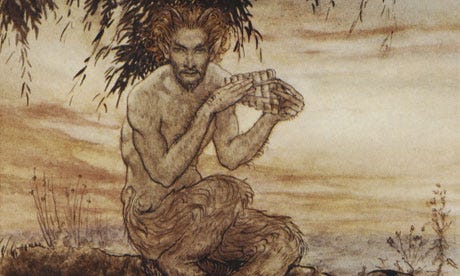Pan
I.
In the high pampas, where the dust rides the horse’s flanks like flame,
Pan gallops—yes!—but in bombachas, with silver spurs,
and the sun is a red wound behind his hat.
He laughs with his teeth, stained with yerba mate and blood,
a knife at his belt, but he touches the earth with the tip of his finger
and the grass shivers with joy.
He sings in Spanish—not Castilian, no,
but Argentino, barbarous and wind-torn.
He rides the wind and smells the rutted mares,
and the bulls know him, they know him,
and the pampas burst open with foals and fire.
But the oil rig drills into the ribs of Gaia—
and Pan spits—
and gallops, vanishes,
beneath the barbed wire and neon signs.
II.
Pan with his crook in the Pyrenees,
bare-kneed, whispering in Euskara,
singing to sheep with the lull of green time.
His face is flint;
his eyes are black as wet stone.
He eats cheese and drinks cider
and dreams basalt dreams, dreams older than the Basajaun.
He moves like a man but smells of goat.
The ewes know when he passes:
they give milk like fountains bursting
from the navel of the earth.
But the roads climb into the sacred hills—
asphalt snakes, hissing, hissing—
and Pan curls on himself, mutters,
calls down the storm that nobody hears.
III.
Pan as a Dutch tulip in the Haarlem light,
panther-petaled, satyr-striped,
a single flame with roots in the canal-mud of blood and trade.
Yes! In the stillness of the greenhouse,
he swells with spring—his pistil, his pollen—
vibrant like a man just come in from the storm.
He is a flower, but not a tame one.
His scent is rut and resurrection.
But the bees are gone—gone!—
and the children come with scissors and iPhones.
They pick Pan to death in selfies.
And Gaia groans beneath glass and gene-editing.
IV.
And then in the north, in Finland,
a pale girl holds him,
Pan as a grey cat with gold eyes,
snug in the crook of her arm.
She smells of lingonberry and deathless snow.
She speaks to him softly in a language
that hums like frost at dawn.
He purrs,
and the house is warm
and the fire dances on the walls—
but outside, the forest is being felled
for lithium and “sustainability.”
The silence is screaming.
And Pan, who is curled in her lap,
closes his eyes with ancient pain.
V.
We have stripped him—Pan—of his world-skin.
We, with our drones and data and dominion,
have hunted him through the veins of Gaia.
We have made of Earth a raped bride,
her thighs torn by machines,
her breasts milked of magma,
her sacred groves turned to “developments.”
But Pan lives. He lives!
He lives in hoofprint and root,
in scent and sudden laughter,
in goat-lust and grass-sap,
in the tremble of leaves when no wind blows.
He lives—yes!—but barely.
A flame in the oil-slick.
A scream in the WiFi.
A final purr
in a dying girl’s arms.
VI.
O Gaia, Gaia,
we do not worship—we violate.
But Pan waits.
He waits not for forgiveness,
but for fire.
Let it come—
that wild unmaking.
Let cities fall like figs in rot,
let steel melt,
let the wind speak again.
Let us be beasts once more—
or nothing.



